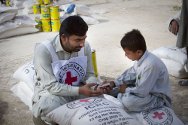The ICRC distributes food to flood victims in Sibi district in Pakistan. An ICRC field officer explains the contents of a food package to a boy who turned up on his own to fetch his ration.
The ICRC, which arrived in Pakistan
The record floods that struck Pakistan Pakistan Afghanistan continues to affect the border areas of Baluchistan , with scores of casualties crossing the frontier into the province in search of medical care.Peshawar Pakistan





0 komentar:
Posting Komentar